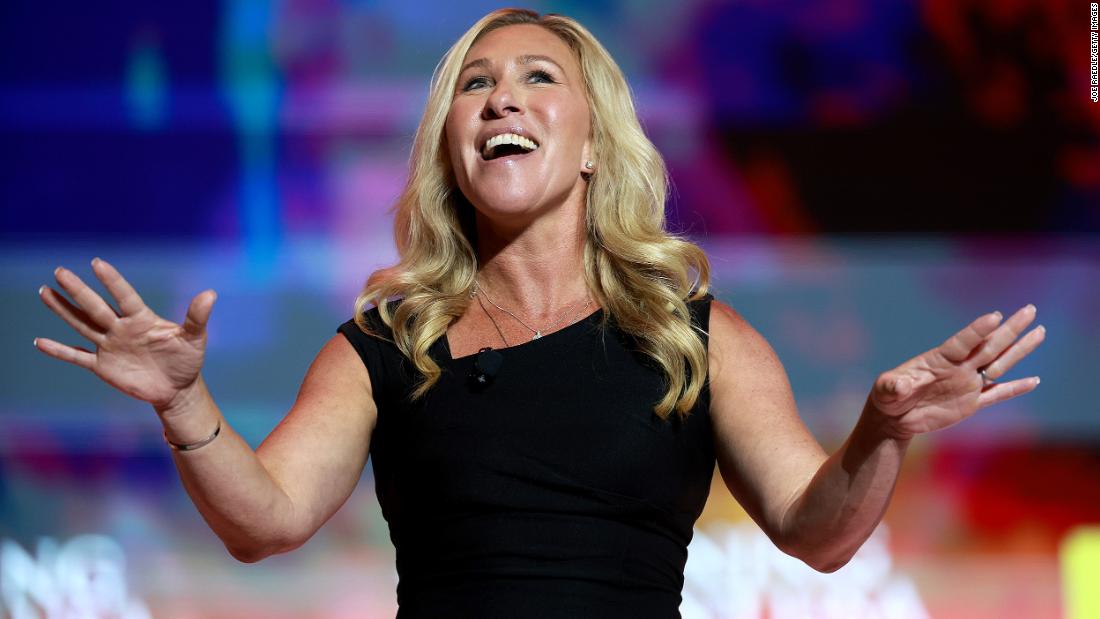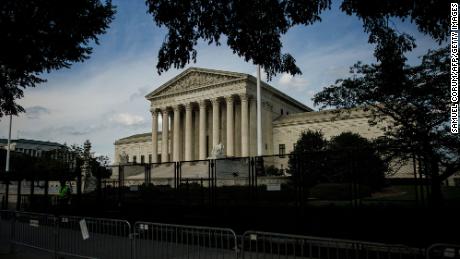“We need to be the party of nationalism and I’m a Christian, and I say it proudly, we should be Christian nationalists,” Greene said in an interview while attending the Turning Point USA Student Action Summit in Florida on Saturday. Her self-avowal of Christian nationalism follows her claim last month that Christian nationalism is “nothing to be afraid of,” and that the “movement” will solve school shootings and “sexual immorality” in America.
For years, I have been closely tracking Christian nationalism and sounding the alarm about it. Greene’s recent comments mark an alarming shift in the public conversation about Christian nationalism.
Until recently, the public figures who most embrace Christian nationalism in their rhetoric and policies have either denied its existence or claimed that those of us who are calling it out are engaging in name-calling. But Greene is evidently reading from a different script now — explicitly embracing the identity as her own and urging others to join her.
She is not alone in doing so. Greene’s embrace of Christian nationalism follows closely after troubling remarks from Colorado Republican Rep. Lauren Boebert: “The church is supposed to direct the government, the government is not supposed to direct the church,” she said at a church two days before her primary election (and victory) in late June. “I’m tired of this separation of church and state junk.” And as CNN has reported, public opinion polling shows that support for Christian nationalism is growing among Christians.
Christian nationalism is a political ideology and cultural framework that merges Christian and American identities, distorting both the Christian faith and America’s promise of religious freedom. It relies heavily on a false narrative of America as a “Christian nation,” founded by Christians in order to privilege Christianity. This mythical history betrays the work of the framers to create a federal government that would remain neutral when it comes to religion, neither promoting nor denigrating it — a deliberate break with the state-established religions of the colonies.
Though not new, Christian nationalism has been exploited in recent years by politicians like former President Donald Trump to further an “us vs. them” mentality and send a message that only Christians can be “real” Americans.
Growing support for Christian nationalism comes at a time when the political ideology behind it poses increasingly urgent threats to American democracy and to religious freedom. Perhaps the most chilling example of Christian nationalism came on the most public of world stages, from some Trump supporters during the January 6 insurrection.
Earlier this year, Baptist Joint Committee for Religious Liberty (BJC), the organization I lead, co-published the only comprehensive report documenting the role of Christian nationalism in coalescing and intensifying support for those who violently attacked the Capitol.
I care about dismantling Christian nationalism both because I’m a practicing Christian and because I’m a patriotic American — and no, those identities are not the same. As Christians, we can’t allow Greene, Boebert or Trump to distort our faith without a fight.
We must speak loudly when our faith is used as a political tool, we must uproot it from our own churches and communities and we must form alliances with religious minorities and the nonreligious — who suffer the impact of Christian nationalism the most.
Religion, and Christianity in particular, has flourished in America not because of government aid or favoritism, but for the opposite reason: religion’s freedom from government control. Government involvement in religious affairs doesn’t aid the free exercise of religion. And as Christians, we are called to love our neighbors rather than make them feel unwelcome in their own country.
As historian Jemar Tisby has written, “[to] follow Christ is to reject the Christian Nationalist ideology. Marjorie Taylor Greene and her allies can follow Jesus’s teachings or the teachings of Christian Nationalism, but they cannot do both.”
Christian nationalism, while pervasive and long-standing, cannot be normalized. I think Christians, who continue to make up a majority of Americans, have a special responsibility to step up at this critical moment to reject Christian nationalism.
Christian lawmakers should choose a different path from Greene and Boebert by calling out Christian nationalism without ignoring their own faith and the religious pluralism that is a significant part of our country’s identity. Christian nationalism runs wild in a society where its peddlers are the only ones talking about the role of Christianity in public life.
Worse yet is a situation when the only detractors from Christian nationalism are the nonreligious, which furthers the false narrative that the only choices for our country are Christian nationalism or no religious expression at all. Religious expression in the United States, from the founding era to the present, has been remarkably diverse, with a growing number of Americans who are not religiously affiliated.
It shouldn’t be difficult for Christian lawmakers who hold very different policy views to reject Christian nationalism. Illinois Republican Rep. Adam Kinzinger responded to Boebert’s comments by calling them out and clarifying that “I say this as a Christian.”
Yet the Republican Party is increasingly accepting of Christian nationalist appeals, such as Pennsylvania gubernatorial candidate Doug Mastriano. The party of former President George W. Bush — who rightly affirmed during the immediate aftermath of 9/11 that “We do not fight Islam” — has given way to a party dominated by Trump.
“As long as we are confident and united, the tyrants we are fighting do not stand a chance. Because we are Americans and Americans kneel to God, and God alone,”
Trump said on Saturday at the same Turning Point USA Student Action Summit where Greene also appeared.
Christian lawmakers don’t need to erase their faith from politics. My fellow Baptist, Georgia Democrat Sen. Rev. Raphael Warnock, has modeled what it looks like for a pastor to serve in Congress without insisting on a privileged place for Christianity in law and society. Oklahoma Republican Sen. James Lankford, a former Baptist youth pastor, and Delaware Democrat Sen. Chris Coons, who was an ordained elder in the Presbyterian Church (U.S.A.), have found ways to work together out of their common Christian concerns.
It’s not just Christian political leaders that need to do better, it’s all of us. In 2019, I joined a group of prominent Christian leaders in launching the Christians Against Christian Nationalism campaign. More than 25,000 Christians have joined the campaign as we seek to elevate an alternative Christian public witness.
We all have work to do because it’s not just the relatively few self-proclaimed Christian nationalists we have to worry about; it’s the way the ideology infects so much of American politics and American Christianity often without us even realizing it.
American Christians can and should be self-critical about the ways our faith and our country have been influenced by Christian nationalism, and we need to come together to loudly reject those who would embrace it as their identity and as a policy direction for the country.
An earlier version of this op-ed included an incorrect date for the launch of Christians Against Christian Nationalism campaign, which began in 2019.

